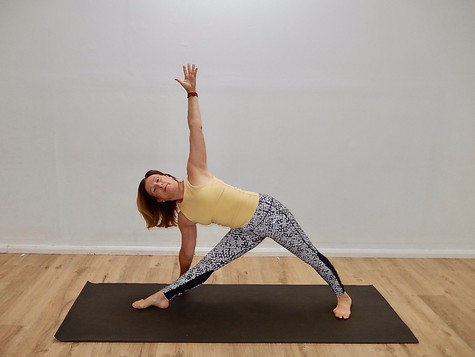If you need support there are advantages to using the ropes for standing poses:
To support the practice & take the load off limbs
To open and decompress joints and spine
For alignment focus
For restorative work, holding poses longer & to release muscular tension
Difficult asanas can be accessed with greater ease
It helps gain deeper stretch, traction
It can also be used therapeutically for specific issues

Ropes are another great prop for experienced students who've come to need some support. They can continue with their level of practice applying their understanding and experience when using the ropes.
Keep the rope taut for all the poses. In standing upright poses the supporting leg is perpendicular to the ground as in the unsupported pose e.g Tree pose (above photo). The integrity of the pose must be maintained when using the ropes, in fact alignment and extension of the body and limbs can be perfected because of the support we get from the ropes.
Hand To Big Toe 1 (Utthita Hasta Padangusthasana I)
1 bottom rope to upper thigh.
Hand To Big Toe 2 (Utthita Hasta Padangusthasana II)
1 bottom rope to upper thigh & arm variation, top hand holding top rope.
Triangle (Utthita Trikonasana)
1 bottom rope around the pelvis.
Extended Triangle (Utthita Parsvakonasana)
1 bottom rope to upper thigh & arm variation, top hand holding top rope.
Half Moon (Ardha Chandrasana)
1 bottom rope to upper thigh & arm variation, top hand holding top rope.
Warrior 3 (Virabadrasan III)
1 bottom rope to upper thigh.
Revolved Triangle (Parivrtta Trikonasana)
1 bottom rope to front leg upper thigh & arm variation, top hand holding top rope. Head variation looking down.
Revolved Half Moon (Parivrtta Ardha Chandrasana)
1 bottom rope to front leg upper thigh.

Intense Side Stretch (Parsvottanasana)
1 bottom rope to front leg upper thigh.
Wide Angle Forward Bend (Prasarita)
2 crossed bottom ropes to upper thighs (as for Down Dog) & crossed arm over head variation.
HAPPY PRACTICE!





































Comments